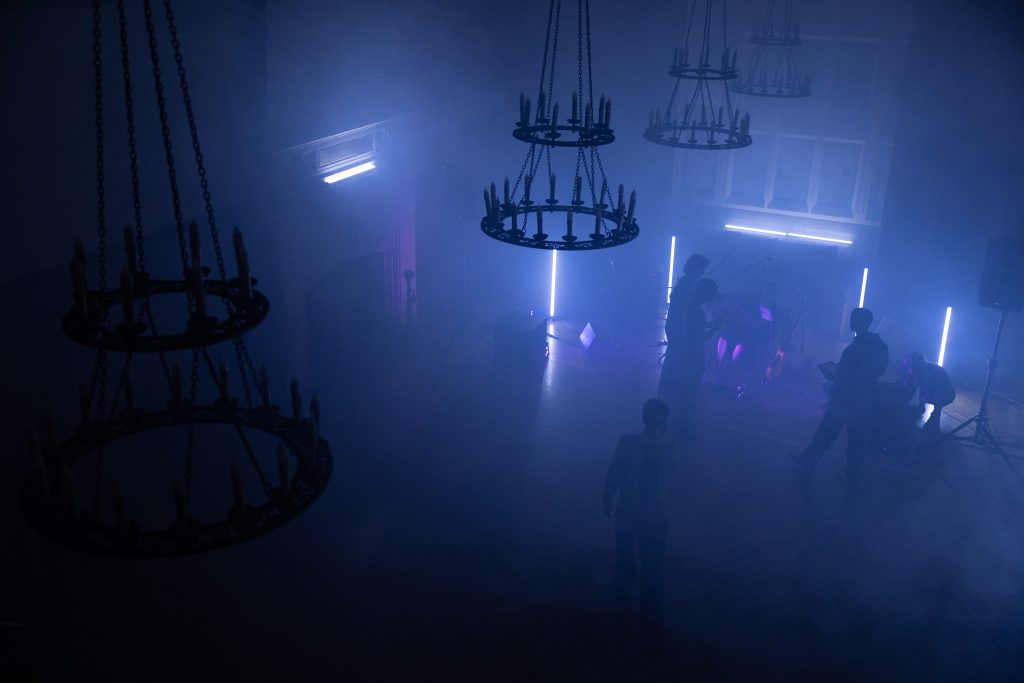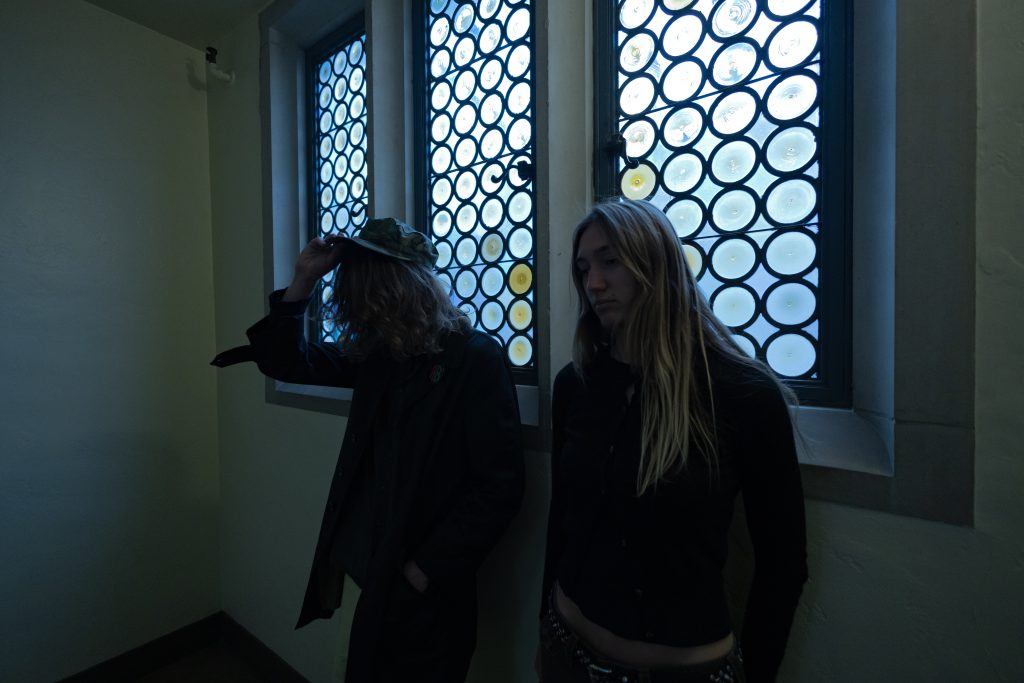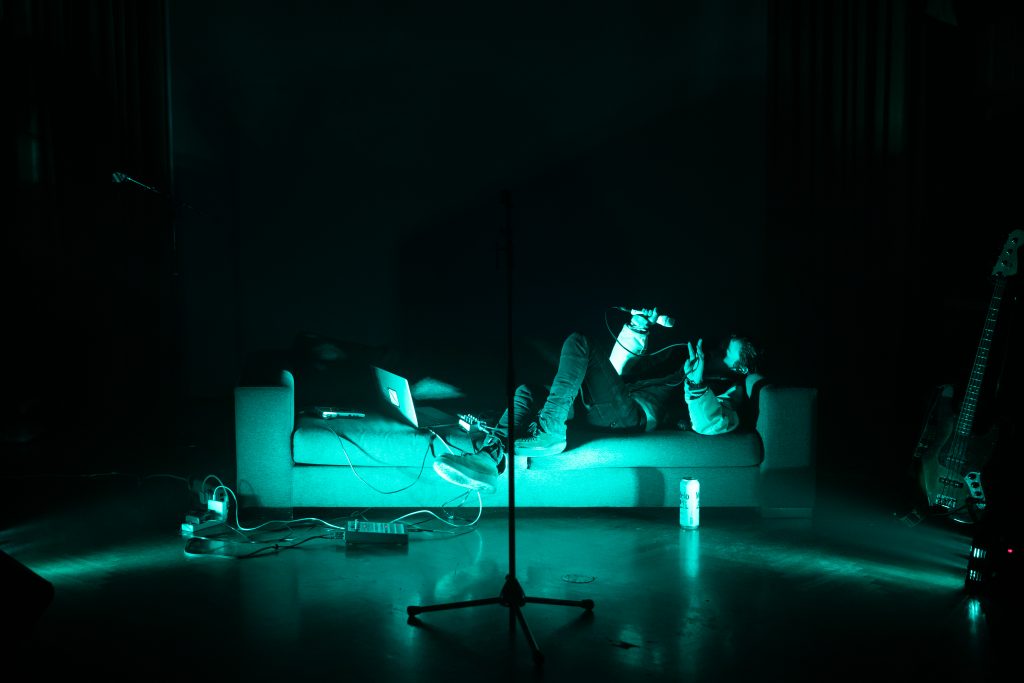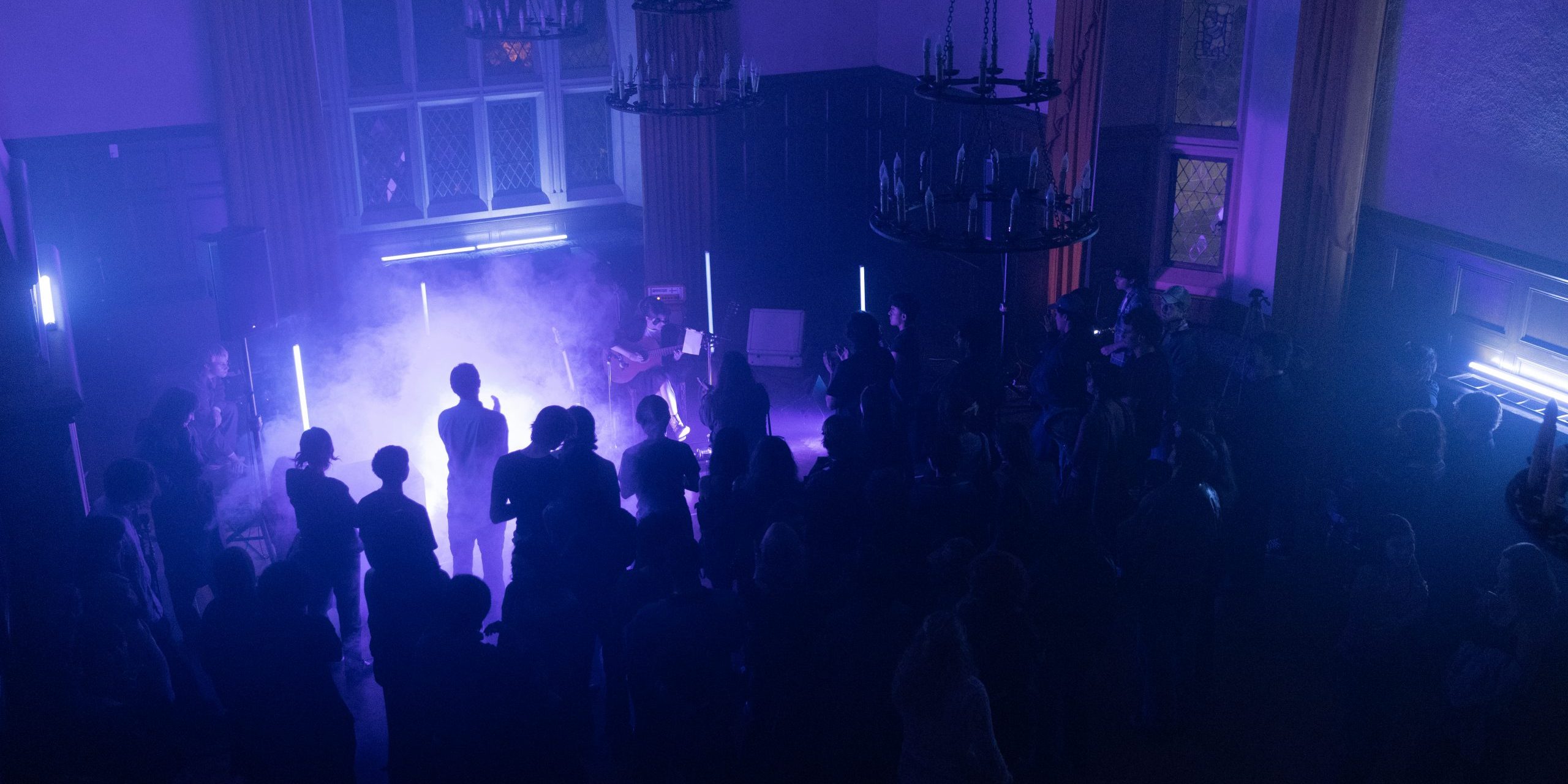Photos by Griffin Ellis (@griffin3llis)
Intermission. Someone storms around the exterior of the building, on the prowl. He finds who he’s looking for: a group huddled around a pack of cigarettes. A sharp announcement: “Absolutely no smoking.” Their corner goes dark again as their lighter goes back in a pocket. “That’s how we get kicked out,” he shouts over his shoulder as he goes back inside. The group seems confused. All boots and baggy pants, they seem to have not gotten the memo that this isn’t a rave.
They aren’t the only ones to have made the mistake. Evidence: the aforementioned cigarette scandal, a guy in line blasting Skrillex out of his phone, someone taking off their shirt to flaunt an Evangelion tattoo. If they somehow missed the early night timeframe (everyone was out before 10) and the location (a reserved building in the center of a public university), they might’ve been disappointed that this night of experimental music didn’t have the same freedom as the underground spaces where it usually thrives.
But that isn’t what DAW is doing. ECHO 006, the latest in the UCLA music club’s experimental performance series, is not an attempt to create a diluted simulacrum of a warehouse, nor a junior rave for students who hesitate to journey downtown. Instead, the club is working within the school’s official spaces to create atmospheres where expression and experimentation can thrive. While many musical performances happen on campus, few are Events in the vein of a DAW show. Combining avant-garde music, detailed attention to space, and multimedia experimentation, the organizers and artists express a relentless curiosity about the possibilities of live performance. They have discovered a vast, sonic freedom within the frame they’ve been given.
The frame of this particular night is Ivy League ornate. When we enter the Kerckhoff Grand Salon, we walk through fog that curls around chandeliers, thick curtains, and stained glass. Wood sculptures stand guard by the entrance, echoing the violent silhouettes of Kara Walker. The carefully arranged lights glow light blue and purple. Everything softly yet definitively separates us from the outside world, putting us in a space of creation. Like the smoke that drifts around the performance space at the back of the room, the entire atmosphere seems designed to feel both tactile and transitory, only here for a moment.

At the edge of this smoke, Sta Dormida is already seated with their guitar, waiting for us. With no great fanfare or announcement, the music begins. There is no separation between performance and life, with the performer’s unassuming presence simply being a part of the space. An alum of DAW, their classical guitar and drifting vocals possess a melancholic, ineffable quality. The lyrics are difficult to parse out, closer to texture than tangible words. This is not the standard acoustic-singer-songwriter set that often occupies the coffee shop next door to the Salon, but rather a cross-stitching of tones, noises, and modulated instrumentation.
Though they sat by themselves, nestled in a cluster of microphones, there is the distinct feeling that they aren’t alone; pre-recorded voices and booming drums turn their solo body into a mini-symphony of machine and human. Between songs, the tones persist as they switch guitars and speak only to request changes in the monitors’ levels. They acknowledge these moments at the very end: “Ran into some technical trouble, but I hope that’s still okay.” The real-time adjustments (made by DAW members subtly darting around the outskirts) did not take away from the experience, but instead heightened it. There was a palpable, unique excitement in seeing the strings as they were being pulled, in feeling that anything could happen or change in an instant.
Second up was LAW, a guitar-accordion duo that began their set as far from the crowd as they can get, engulfing themselves in the fog. Artists Luisa and Jonah carve sharp, distinct melodies into the walls of noise that ground their compositions. As opposed to Sta Dormida’s ever-flowing river of sound, there are distinct silences between each song as the two adjust themselves in space, moving from seated to standing as the set progresses. Their songs are not trapped in predictable pop song structure, but they aren’t static either. Bodies move as their instruments discover new, hypnotic sonic realms, never content. During the final song of their set, guitarist Jonah launched themselves across the white tape separating Us from Them. Riding a wave of feedback, they changed how the space operates, how we arrange ourselves.

We become aware of our own bodies, and how they exist in relation to the performers just inches from us. We don’t just happen to be here, an innocuous presence waiting to be blasted with music, but rather active participants. We sense this some more as headliner Lolina begins to set up for her performance. We watch her sound check and work with DAW to transform the space, chatting and laughing. She politely lets us know that she’ll just be a few more minutes. We keep watching. She tells us again. A few people leave, but most linger. Eventually, she waves us away, all but commanding us to leave her alone to focus. We listen. We go outside. We don’t smoke.
When we re-enter, the Salon is bathed in a green light that holds strong for the entire performance. A screen has lowered, covering the windows. A couch, littered with wires, instruments, and a laptop, stretches across the space, just as Lolina stretches across it.
Her set is the culmination of the night’s blend of music and event, performance and theater. Performing as characters from her latest album, Unrecognizable, she exists in what seems like an entirely different world from us. The atmosphere created by her and DAW conjures 3 A.M. Skype calls, K-holes, rabbit holes, and voice memos. She speak-sings with a monotone snark drenched in reverb, accompanied by pounding drums and rumbling bass. From this cold, woozy expanse comes occasional bursts of euphoria – the Prince-referencing “Easy Rider Geneva Heat” is almost danceable, discovering an energy and sensuality that had been lurking underneath the entire set.

Throughout the set, she never acknowledges the audience, with the gaps between songs so minimal that they resist applause. She’s not speaking to us, but there’s a feeling she’s speaking to someone. She’s pretending that she’s not being looked at, emulating the faux-casualness of a subtweet or an Instagram story fit-check. I don’t need you, it seems to say. Yet, of course, they’re still performing. This very digital way of being is physicalized and dissected by Lolina, who recreates the act of scrolling and making music in a private room. We just happen to be sharing the space.
The whole thing made me reconsider what I want as an audience member, what I think I’m owed. The lack of engagement gave me space to reflect, to not be told what to think or feel trapped in the cliches of “This one’s called” and “So happy to be here.” The whole thing seems like it could exist without us, like it would happen whether we’re watching it or not. Yet everyone – DAW regulars, the ravers, new-comers – was engaged, moving with the performance and giving themselves over to its atmosphere. When she finishes, there’s no thanks for us, just an abrupt stop and a beeline for the green room. The show is over.
The night was more than just a display of music; it was an experiment in how to stage live performances in ways that deepen their impact. The artists all played with space, character, and technology to push musical performance into zones mostly reserved for avant-garde theatermakers, while DAW gave them the atmosphere within which these forays into the unknown could be supported and expanded. The club’s commitment to creating collaborative spaces was actualized with ECHO 006, the latest in a series that hopefully will continue to revitalize the live music scene at UCLA. Whether you’ve been noticing or not, DAW is curating the most curious and unique musical events on campus. Look out for the next one.




